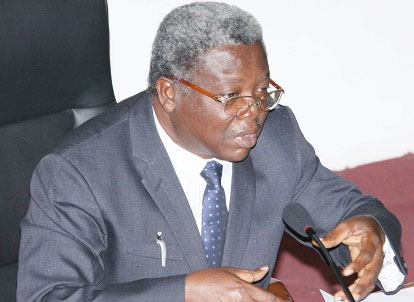The Judicial Service Staff Association (JUSAG) has written to the Chief Justice, Georgina Theodora Wood, asking her to press Justice Yaw Apau, an Appeals Court Judge, to “withdraw” public claims of corruption he made Wednesday against middle and junior staff of the Judiciary.
“People always talk about corruption on the bench; they think it is the judges who take money. Sometimes our Clerks, Court Registrars, even Lawyers are so involved in this dubious act,” the respected Judge, who chairs the body investigating past judgment debt payments in Ghana, said at Wednesday’s public sitting of the Commission.
He added, “My own interpreter collected a huge amount of money from someone assuring him that judgment would go in his favour without my knowledge. It was later that I got to know that he (my Clerk) collected an outrageous amount on my behalf”.
His comments appear to have rattled JUSAG, the umbrella association that protects the interests of staff of Ghana’s Judiciary countrywide.
In a letter to the Chief Justice, JUSAG Chairman, Francis Brakwa, said: “Much as we would agree that there are bad nuts in every institution, we seriously disagree with His Lordship, Justice Yaw Apau’s assertion that Registrars and Clerks were those corrupting the Judicial System.
“We must state that there are hard-working, honest and incorruptible Registrars and Clerks in the Judicial Service and we believe their contribution towards the administration of justice must be commended instead of [them] being labeled as corrupt officers”.
The statement called on the respected Appeals Court Judge to “take a second look at” his comments and “withdraw” them “as a show of respect for the over 5,000 employees of the Judicial Service who feel peeved by his accusation…”
It also prayed the Chief Justice to use her office to ensure Justice Apau and all other Judges and staff of the Judiciary desist from “passing derogatory comments that go to insult …the supporting staff of the Judicial Service.”
The statement did not say what remedies JUSAG might seek in the event that Justice Apau declines to comply with the association’s demands. The Judge was not immediately available for comment on JUSAG’s demands.
His comments on Wednesday came over a year after the Global Corruption Barometer Report ranked Ghana’s Judiciary among the nation’s most corrupt public institutions.
Ghana’s index was conducted among 2,000 respondents across the nation’s ten regions.
In ranking institutions on the scale of corruption, the respondents gave the Ghana Police Service a score of 4.7 out of 5, labeling it the most corrupt public institution in the country. Political parties followed the Police Service with a score of 4.2 out of 5 points. The judiciary followed closely on 4 out of 5 points.
In what appears to be a confirmation of the above findings on judicial corruption in Ghana, Justice Apau told Wednesday’s sitting of the Judgment Debt Commission that, “Sometimes it is interesting that after court proceedings have ended you see people murmuring because they paid money to Clerks, Lawyers, Court Registrars thinking that the judge would rule in their favour. If judgment goes in their favour they are happy but if not then they blame the judges. Some lawyers charge these exorbitant fees (in billions) and even go to the extent of charging for the Judges”.
He added: “Some of the clients are equally guilty because sometimes if they have a bad case they think money will make their case good”.
He warned Junior Staff at the Judiciary to refrain from shameful and corrupt acts that bring the image of the judiciary into disrepute.
The issue of judicial corruption in Ghana remains a controversial subject that has in the recent past set a number of Ghanaian lawyers on a war path with the bench.
In 2011, Dr. Raymond Atuguba, now the Executive Secretary to President Mahama, provoked outrage among the nation’s judges after he made damaging claims of corruption in the Judiciary.
At a roundtable on the Judiciary and Ghana’s justice system in Accra, Dr Atuguba said, “Between 1997 and 1999, I stayed in the house of a judge, and so there is nobody in Ghana who can convince me that judges are not corrupt”.
He said whilst living on the same compound with some of the nation’s judges, he saw people who mistakenly brought bribes, meant for judges “next door” to his gate.
“Immediately they mention the title of the case, then you knew that, no, this is not a visitor coming to leave a gift; this [is] a bribe for the judge next door,” he said.
Dr Atuguba, a trained lawyer, claimed however that in his association with a man he called an “upright judge”, he found that on a number of occasions the judge returned bribes brought to him and at times, “I had to assist him to drive some of the people away”.
In the wake of Dr. Atuguba’s comments some Judges and Magistrates –– in line with a call by the Association of Magistrates and Judges of Ghana –– decided not to sit on cases involving him and three other lawyers who made similar charges of corruption against the bench.
The Association of Magistrates and Judges of Ghana later filed a complaint, calling on the General Legal Council to probe the claims of the four lawyers.
“Our requests to the Council are for the assertions made by the lawyers on corruption in the judiciary to be investigated and the critics given the chance to substantiate what they assert,” the Association said a statement to the media in May 2011.
The Association’s complaint prompted two top members of the Forum For Governance and Justice (FGJ), Dr. Clement A. Apaak and Dr. Samuel C.K. Buame, to file a legal suit (Motion On Notice, Ex-Parte) in the High Court of Justice (Fast Track Division) seeking to restrain the General Legal Council (GLC) and its Disciplinary Committee from sitting on the complaint.
By: Richard Dela Sky/citifmonline.com/Ghana


